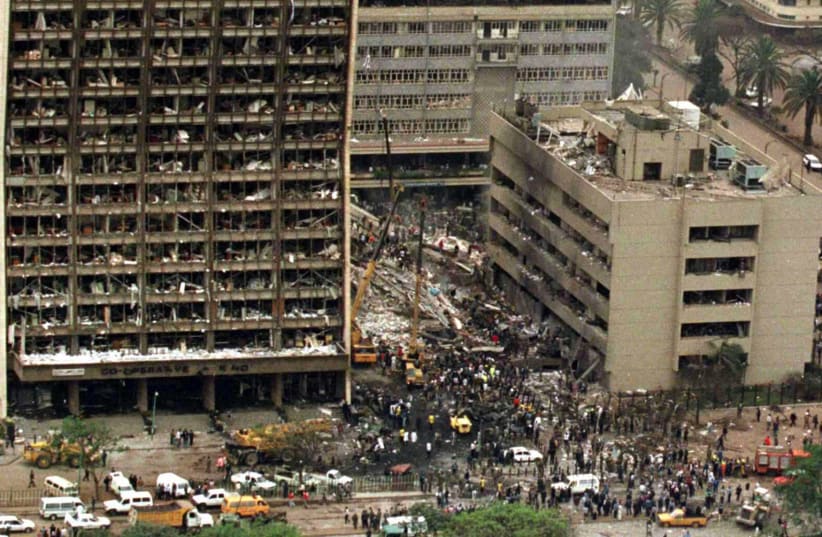When Americans talk about terrorism, they seem to bifurcate time as being either “pre-” or “post- September 11,” using the most infamous of many attacks as the chronological starting point of foreign terrorism against the United States. Many other horrific events tend to be overlooked.
The case in point: this Wednesday, August 7, marks the 21st anniversary of Al-Qaeda’s twin bombings of the American Embassies in Nairobi, Kenya, and Dar es Salaam, Tanzania, which killed 12 Americans and hundreds of Kenyans and Tanzanians. Two of the American diplomats killed in the bombing had served in Israel, one of America’s greatest allies, prior to serving in Kenya. Julian Bartley, whose son Jay, was also killed in the attack, worked at the U.S. Mission in Tel Aviv. The other victim was my mother, Prabhi Guptara Kavaler, who worked at the old U.S. Consulate in east Jerusalem with my father, Howard Kavaler. Israel deeply impacted both our families. My mom tried unsuccessfully for years to get me to call her “Ima.”
The morning of August 7, 1998, started out like every other morning since my family moved to Kenya two weeks prior. I woke up, poured myself a bowl of Golden Crisp cereal with powdered milk, the norm in Nairobi where the cost of regular milk was exorbitant and could also make you sick. I picked up my book, The Red Badge of Courage, and began to read, looking forward to the fact that it was Friday and my parents would be around more for the weekend. We had lived in Nairobi before, when I was three-years old. I was lonely and my friend Karin, my closest friend whom I met on our previous tour, was out of town. I called my mother to update her on the status of my work. My mother, who we would now describe as a “tiger mom” was from India. School was starting the following week and she wanted me ready, so she assigned me math problems to do every day. When I called Mom, she told me she couldn’t speak right now and that she would call me back in five minutes. That was the last time I spoke with her.
Fifteen minutes passed and I tried calling Mom, but there was a busy signal. After a few minutes I tried again, and again and again. After getting the same busy signal when I tried calling my dad, I knew that something was wrong.
I went outside and spoke to the guard, which every diplomat had in Kenya, and asked him if he knew what was going on. He told me that a bomb had gone off and that I needed to get back inside the house. I went back inside and started sobbing.
My father came into the house several hours later with my Aunt Judy, a close family friend. He had cuts all over his face and his suit was torn. I asked, “Where’s Mom?” My father started to cry. “Mom’s dead.”
My mom was smart and funny and fiercely patriotic. She instilled these values in me, too, in many different ways. Like most parents, my mother, would often tell me before going out in public that I needed to behave. Her explanation, however, was slightly unorthodox: My misbehavior would reflect badly on America. We represented the United States of America overseas and acting improperly would make people think all Americans acted that way.
Mom met Dad on his first assignment as a Foreign Service Officer in India. After she married my dad, she became a U.S. citizen and went on to join the Foreign Service as well. My mother did this even though many told her that she would never pass the Foreign Service exam; they said it was difficult and she didn't have the same knowledge base as those who were American born. She passed on her first try. Now my mom is the first Indian-born American to be buried in Arlington National Cemetery. My father, who died six days after the 20th anniversary of my mother’s death, is now buried with her.
American Embassies are considered to be American soil so the attacks of August 7, 1998, were attacks against America.
Americans should use this day to not only remember my mother and all the others who were killed that day while working in service to the United States, but to remember as well that American diplomats put their lives on the line to serve their country. Foreign Service families are the first responders for the diplomatic community. They are deserving of a new measure of time for Al-Qaeda terrorism perpetrated on American soil: “Before August 7 and after.”
Tara Kavaler is an intern in The Media Line's Press and Policy Student Program. The Media Line is the American news agency specializing in coverage of the Middle East. Themedialine.org.
